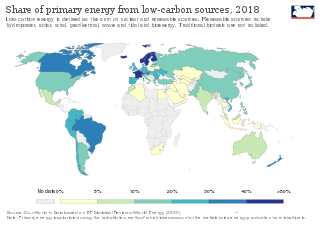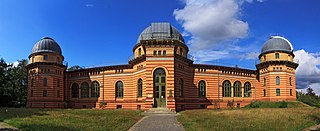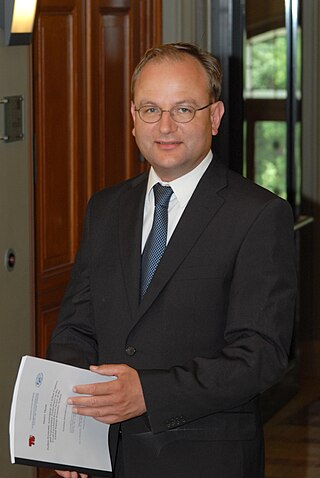
Low-carbon electricity or low-carbon power is electricity produced with substantially lower greenhouse gas emissions over the entire lifecycle than power generation using fossil fuels. The energy transition to low-carbon power is one of the most important actions required to limit climate change.

The Potsdam Institute for Climate Impact Research is a German government-funded research institute addressing crucial scientific questions in the fields of global change, climate impacts, and sustainable development. Ranked among the top environmental think tanks worldwide, it is one of the leading research institutions and part of a global network of scientific and academic institutions working on questions of global environmental change. It is a member of the Leibniz Association, whose institutions perform research on subjects of high relevance to society.

Hans Joachim "John" Schellnhuber is a German atmospheric physicist, climatologist and founding director of the Potsdam Institute for Climate Impact Research (PIK) and former chair of the German Advisory Council on Global Change (WBGU). Since 1 December 2023, Schellnhuber is the Director General of IIASA.

Ottmar Georg Edenhofer is a German economist who is regarded as one of the world's leading experts on climate change policy, environmental and energy policy, and energy economics. His work has been heavily cited. Edenhofer currently holds the professorship of the Economics of Climate Change at Technische Universität Berlin. Together with Earth scientist Johan Rockström, economist Ottmar Edenhofer is scientific director of the Potsdam Institute for Climate Impact Research (PIK), representing the interdisciplinary and solutions-oriented approach of the institute. Furthermore, he is director of the Mercator Research Institute on Global Commons and Climate Change (MCC). From 2008 to 2015 he served as one of the co-chairs of the Intergovernmental Panel on Climate Change (IPCC) Working Group III "Mitigation of Climate Change".

Anders Levermann is a climate scientist at the Potsdam Institute for Climate Impact Research and Columbia University. He is a Professor of the Dynamics of the Climate System at Institute for Physics and Astrophysics of the Potsdam University, Germany. He has been involved in the assessment report of the Intergovernmental Panel on Climate Change since 2004. Levermann advises political and economic stakeholders on the issue of climate change.

Johan Rockström is a Swedish scientist, internationally recognized for his work on global sustainability issues. He is joint director of the Potsdam Institute for Climate Impact Research (PIK) in Germany, together with economist Ottmar Edenhofer. Rockström is also chief scientist at Conservation International. He is Professor in Earth System Science at the University of Potsdam and Professor in Water Systems and Global Sustainability, Stockholm University.

GAIA: Ecological Perspectives for Science and Society is a peer-reviewed academic journal established in 1992. Its main focus is on background information, analyses, and solutions of environmental and sustainability problems. Since 2001 it is published by oekom verlag. Articles are in English and German. The editor-in-chief is Helga Weisz . GAIA follows the Green Road to Open Access: Authors can archive their article for free public use on personal websites and/or in any open access repository immediately after publication . Authors retain copyright: All articles are published under the terms of the Creative Commons Attribution license CC BY 4.0. Additionally, GAIA offers GAIA Hybrid Option: With this option authors can publish their articles with full open access against a basic charge.

Fatima Denton is a British-Gambian climatologist. She is the director at the Ghanaian branch of the United Nations University, at the UNU Institute for Natural Resources in Africa (UNU-INRA) in Accra. She focuses on innovation, science, technology and natural resource management. She partners with countries such as Benin and Liberia to develop and implement country needs assessment missions.

The Research Institute for Sustainability (RIFS) in Potsdam conducts research with the aim of investigating, identifying, and promoting development pathways that engender environmentally sustainable practices internationally. The Institute was integrated into the Helmholtz Association in 2023 and now forms part of the GFZ German Research Centre for Geosciences. Its research approach is transdisciplinary. The RIFS cooperates with partners in science, political and administrative institutions, business groups, and the wider civil society to develop solutions to sustainability challenges. Its research topics include the energy transition, climate change, socio-technical transformations, sustainable governance, and cultures of transformation in the Anthropocene. A network of both national and international partners and the Fellow Programme supports the work of the Institute.

A carbon budget is a concept used in climate policy to help set emissions reduction targets in a fair and effective way. It examines the maximum amount of carbon dioxide emissions that would result in limiting global warming to a given level". It can be expressed relative to the pre-industrial period. In this case, it is the total carbon budget. Or it can be expressed from a recent specified date onwards. In that case it is the remaining carbon budget.

Thomas Nils Samuel Sterner is Swedish economist and a professor of environmental economics at the University of Gothenburg in Sweden. His research and publications are mostly focused on the design of policy instruments which address environmental problems. Sterner has published more than 125 articles in refereed journals. He has a Google scholar h-index of 50 (2021). He authored or edited more than a dozen books and a large number of book chapters, official reports and journalistic articles regarding environmental policy instruments. These publications include applications to energy, climate, industry, transport economics and resource management in developing countries.
Mark G. Lawrence is an American atmospheric scientist whose research focuses on a range of sustainable development topics at the science policy and science-society interface. He is scientific director at the Research Institute for Sustainability (RIFS) in Potsdam (former Institute for Advanced Sustainability Studies in Potsdam.
Sérgio Campos Trindade was a Brazilian chemical engineer and researcher, specialist in renewable energies and consultant in sustainable business. Trindade was the coordinating lead author for a chapter of an Intergovernmental Panel on Climate Change (IPCC) report, Methodological and Technical Issues in Technology Transfer (2000); the IPCC as an organization won the 2007 Nobel Peace Prize as a result of its contributors' work.
Sabine Fuss is a German climate scientist. She heads the "Sustainable Resource Management and Global Change" working group at the Mercator Research Institute on Global Commons and Climate Change (MCC). She is a professor at Humboldt University of Berlin.

Brigitte Knopf is a German climatologist. Since February 2015 she has been Secretary General of the Mercator Research Institute on Global Commons and Climate Change and since 1 September 2020 has been a member of the Expert Council on Climate Issues.
Helga Weisz is an Austrian industrial ecologist, climate scientist, and professor of industrial ecology and climate change at the Institute for Social Sciences at the Humboldt University of Berlin. She heads the FutureLab "Social Metabolism & Impacts" at the Potsdam Institute for Climate Impact Research (PIK).
Ricarda Winkelmann is a German mathematician, physicist, and climatologist. She is a professor of Climate System Analysis at Potsdam University and the Potsdam-Institute for Climate Impact Research. She studies interdependencies between climate, land ice, and the ocean.
Joeri Rogelj is a Belgian climate scientist working on solutions to climate change. He explores how societies can transform towards sustainable futures. He is a Professor in Climate Science and Policy at the Centre for Environmental Policy (CEP) and Director of Research at the Grantham Institute – Climate Change and Environment, both at Imperial College London. He is also affiliated with the International Institute for Applied Systems Analysis. He is an author of several climate reports by the Intergovernmental Panel on Climate Change (IPCC) and the United Nations Environment Programme (UNEP), and a member of the European Scientific Advisory Board for Climate Change.
Felix Creutzig is a German physicist, and professor of Sustainability Economics at Technische Universität Berlin.














